

Mayor Garcetti unveils open data website for City of Los Angeles. Mae Ryan/KPCC LA Mayor Eric Garcetti Los Angeles Mayor Eric Garcetti announced the launch of data.lacity.org, an open resource offering access to data collected by the City of L.A., at a conference today hosted at City Hall called #techLA.
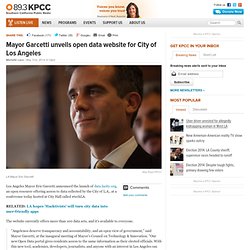
RELATED: LA hopes 'Hacktivists' will turn city data into user-friendly apps The website currently offers more than 100 data sets, and it's available to everyone. "Angelenos deserve transparency and accountability, and an open view of government," said Mayor Garcetti, at the inaugural meeting of Mayor's Council on Technology & Innovation. Back in December 2013, Garcetti announced the launch of this program: "To promote transparency and accountability, the City of Los Angeles (“City”) will make publicly available raw data in easy-to-find and accessible formats. The new site isn't the first project the City of L.A. has undertaken in his effort to increase government transparency. Careful: Your big data analytics may be polluted by data scientist bias. Expectations surrounding the future of big data range from the just huge to absolutely enormous – a reflection perhaps of both its real inherent potential and all the massive hype.
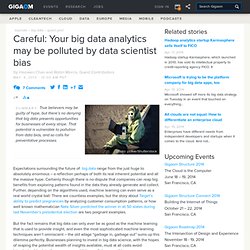
Certainly though there is no dispute that companies can reap big benefits from exploring patterns found in the data they already generate and collect. Further, depending on the algorithms used, machine learning can even serve as a real world crystal ball: There are countless examples, but the story about Target’s ability to predict pregnancies by analyzing customer consumption patterns, or how well known mathematician Nate Silver predicted the winner in all 50 states during last November’s presidential election are two poignant examples. But the fact remains that big data can only ever be as good as the machine learning that is used to provide insight, and even the most sophisticated machine learning techniques aren’t omniscient – the old adage “garbage in, garbage out” sums up this dilemma perfectly.
Open data innovator Ian Kalin joins Socrata. Kalin comes to Socrata from the White House, where he served as a Presidential Innovation Fellow News | by CIOL Bureau SEATTLE, USA: Socrata, Inc., a Seattle-based cloud software company focused exclusively on democratizing access to government data, today announced that Ian Kalin has become its Director of Open Data.
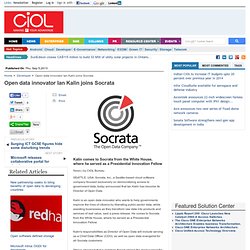
Kalin is an open data innovator who wants to help governments improve the lives of citizens by liberating public-sector data, while assisting businesses as they transform raw data into products and services of real value, said a press release. He comes to Socrata from the White House, where he served as a Presidential Innovation Fellow. Here's What I'm Doing to Make Canada's Government More Open. In April 2012, Canada became a proud member of the Open Government Partnership, a global movement, now numbering 60 countries, which looks to make government more transparent, effective and accountable. These goals reflect our government's commitment to good governance and the cost-effective and responsible use of taxpayer dollars. On August 19, the federal government launched a three-week online consultation asking Canadians for their thoughts on how we have progressed on our Open Government agenda.
We issued two news releases to promote the consultation and tweets are being posted daily encouraging Canadians to participate and provide feedback on everything from the Open Data portal and the International Aid Transparency Initiative to access to information. As President of the Treasury Board and Minister responsible for Open Government, I have tweeted about the consultation to my 33,000-plus Twitter followers.
Loading Slideshow. Future SEO: Linked Open Data (LOD) As mentioned in my column on string entity optimization, the use of structured data allows search engines like Google to understand your page content so it can display better search results, or answers, to user queries.
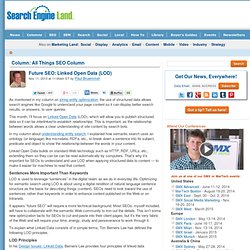
This month, I’ll focus on Linked Open Data (LOD), which will allow you to publish structured data so it can be interlinked to establish relationships. This is important, as the relationship between words allows a clear understanding of site content by search bots. In my column about understanding entity search, I explained how semantic search uses an ontology (or language) like microdata, RDFa, etc., to break down a sentence into its subject, predicate and object to show the relationship between the words in your content. Linked Open Data builds on standard Web technology such as HTTP, RDF, URLs, etc., extending them so they can be can be read automatically by computers.
Sentences More Important Than Keywords LOD Principles. Knowledge for everyone. The Open Data Handbook — Open Data Handbook. Why was this secret? Open data. An introductory overview of Linked Open Data in the context of cultural institutions.
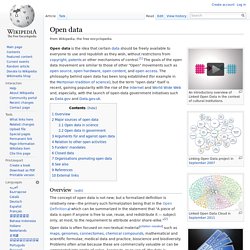
Clear labeling of the licensing terms is a key component of Open data, and icons like the one pictured here are being used for that purpose. Overview[edit] Open Data Portal. 0 Have you ever wondered… which of Europe’s countries has the greenest energy supply?
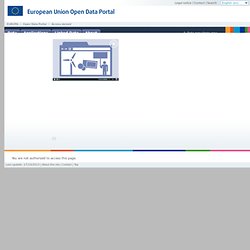
Or which of its economies are growing fastest? Or which organisations are lobbying the EU? Or how EU public funds are being spent? The EU gathers and generates data about these and about many other things. The Open Data Foundation. How can open data help us make better decisions? How can open data help us make better decisions?
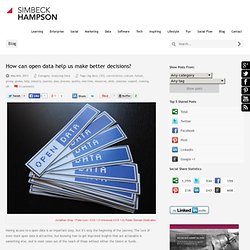
Jonathan Gray / Foter.com / CC0 1.0 Universal (CC0 1.0) Public Domain Dedication Having access to a open data is an important step, but it’s only the beginning of the journey. The lure of even more open data is attractive, but knowing how to get improved insights that are actionable is something else, and in most cases out of the reach of those without either the talent or funds. “The UK is absolutely at the vanguard of the global open data movement, and NGOs have a great sense that this is something they want to play a part in. Although open data may in part be a solution for the ‘fear of failure’ problem, it would seem that this is more a solution looking for a problem.